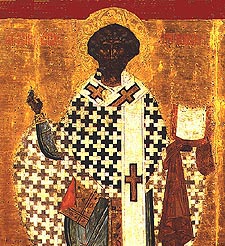|
|||
|---|---|---|---|
| This weekly bulletin insert complements the curriculum published by the Department of Christian Education of the Orthodox Church in America. This and many other Christian Education resources are available at http://dce.oca.org. | |||

Saint Clement of Rome is one of the Apostolic Fathers. That title is given to a group of men who taught and defended the faith in the first centuries of Christianity, when problems and wrong teachings abounded. Saint Clement is the first of these Fathers, and his "Letter to the Corinthians" is one of the earliest existing Christian documents outside the New Testament. The details of Clement's life are not well-known. He "saw the blessed Apostles and conversed with them, and had still ringing in his ears the preaching of the Apostles and had their tradition before his eyes..." as Saint Irenaeus writes. Most historians agree that he is the person Paul refers to in Philippians 4:3 as "Clement, and the rest of my fellow workers, whose names are in the Book of Life". He was the third successor of Saint Peter as Bishop of Rome, and served from about 92 to 101 A.D. Those years were not easy, because Clement attracted people to the Christian faith, rousing the fear and hatred of still-powerful pagans. But Clement's letter to the Corinthians, written a decade before his episcopal consecration, was not a response to problems with pagans. It was an effort to bring peace to the deeply divided members of the Church at Corinth. Already, years earlier, Saint Paul had addressed serious problems in Corinth. Greed, lust and mutual disrespect were threatening the stability of the Church there. Paul's letters had to confront these things, and also defend his apostolic authority, which was being questioned and denigrated. The disunity in Corinth continued. Clement sent his letter because one younger faction had conspired to depose the older leaders. Gently but gravely, he reminded them of their Christian duty to love and respect one another. The letter's opening greeting is from "the Church of God which sojourns in Rome to the Church of God which sojourns in Corinth." This reminds us that then, as now, the Church has seen herself as a "sojourner" and not a permanent resident in this earthly realm. Another part of the letter shows that the Church faced difficulties from many directions. Clement writes that "owing to the sudden and repeated calamities and misfortunes which have befallen us we must acknowledge that we are somewhat tardy in turning our attention to the matter in dispute among you, beloved..." The "calamities and misfortunes" may be imperial persecutions, or the eruption of Mount Vesuvius in the year 79, which caused a devastating fire in Rome.
Clement doesn't hold back in admonishing Corinth's Christians. He deplores "that abominable and unholy sedition, alien and foreign to the elect of God, which a few rash and self-willed persons have enflamed to such madness..." Yet he also urges them to turn to God, confident that He will not be angry over our sins forever. Clement writes that Scripture tells us to "take shelter in your rooms for a little while, until My wrath subsides. Then I will remember the good days, and will raise you from your graves." |
|||
